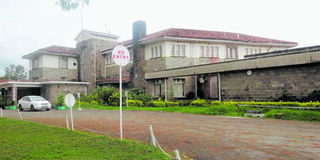Iconic Tea Hotel on death bed after years of neglect

Tea Hotel in Kericho town. The iconic hotel has been closed by workers who are demanding nine-month pay. PHOTO | ANITA CHEPKOECH | NATION MEDIA GROUP
What you need to know:
- Workers have gone on strike demanding nine-month pay arrears amounting to more than Sh10 million.
- Hotel was popular with top government officials, including two presidents.
Kericho’s pre-colonial Tea Hotel was barely two years old when Britain’s longest serving monarch, Queen Elizabeth II, then a princess, visited it.
She had toured the country in 1952 alongside Prince Edward.
She is said to have been booked in room Seven at the hotel, which was the first in the South Rift to be listed by the World Tourist Organisation.
WRANGLES
In years that followed, it would attract hundreds of international tourists, generating hundreds of jobs for locals.
But that rich and solid history has not helped prevent endless boardroom wrangles.
Two weeks ago, Tea Hotel closed its doors to the public for the first time.
This was after employees went on strike demanding nine-month salary arrears amounting to more than Sh10 million.
EMPTY PROMISES
The more than 75 workers said no activity would go on at the hotel until the management paid them.
Mr Charles Koros, a shop steward and representative of the workers, said the management had time and again made empty promises of settling the workers' pay.
“The management has gone into hiding, yet we have not paid our rent and our children are no longer going to school,” he said.
DISAPPEAR
Mr Musa Langat of the food and beverage management section, blamed mismanagement and internal wrangles among directors for the hotel’s downfall.
“The problem is not occupancy. Visitors always come, eat and sleep, but the profits disappear," he said.
“There is bad blood between directors. The same applies to the managers. They cannot even control the wage bill and neither can they maintain the premises; they are greedy.”
WAY FORWARD
Kenya Union of Domestic, Hotels, Educational Institutions, Hospitals and Allied Workers (Kudheiha) official Alice Ng’eno said the employees had a right to strike and were not not begging to be paid.
But the management says it is looking into ways of reviving the hotel.
Mr Henry Belsoi, who is one of the directors of Yaas Angwan, said the managers planned to meet on March 24 to chart the way forward following the hotel’s closure.
COURT CASES
However, he added that the hotel would only see better days after the conclusion of two court cases; one at Kericho High Court in which it accuses Sololo Investments of acquiring shares illegally and irregularly from KTGC, and another being handled by the Directorate of Criminal Investigations.
“I tried my best to keep the hotel afloat despite the long standing issues. There were times we would not even hold Annual General Meetings, but we reported the matter to the registrar of companies who convened one for us in 2014,” Mr Belsoi said.
EXPATRIATES
The hotel picked its name from the fact that it was established in a tea growing area.
Set up on a 27-acre piece, five minutes’ drive from Kericho town on the Nakuru highway, the hotel was built in 1950 by Brooke Bond Tea Ltd (now Unilever Tea) as a welfare and accommodation centre for senior management staff, mainly British expatriates.
Its architects borrowed from English history.
REMISCENT
It was built like a castle with the characteristic old-style architecture of high walls only, providing its guests to a journey back to the glorious era when raised ceilings were considered a mark of status.
Its interior decoration is reminiscent of the Victorian era with long-lasting wooden floors and vintage furniture that the hotel has maintained for decades, huge fire places and exquisite chandeliers.
It has sizeable ball rooms fit for evening parties as well as green rolling gardens that earned it the name — The Grand Hotel of Kericho.
STATE LODGE
The hotel’s history cannot be complete without its political significance, having offered perfect scheming grounds for stalwarts of independence party, Kanu.
Kanu Secretary-General Nick Salat and former Bomet Governor Isaac Ruto say the hotel was once like a state lodge for the country’s first President Jomo Kenyatta.
During his visits to the region, Tea Hotel would provide a venue for key Kanu meetings.
PRESTIGE
Mr Salat said his first experience of the hotel was in 1979 after it ceased being a reserve of “wazungus”.
“For some of us born and raised in Kericho, Tea Hotel was our first encounter with what was then the most modern hotel. It was something you would brag to your peers in the village about having been to,” Mr Salat said.
“My first encounter there was a full breakfast which was a highlight of prestige then.”
MAASAI MARA
According to Mr Salat, there had been rooms set aside for President Kenyatta and later another one for his successor, Daniel arap Moi, which later became to be known as Kenyatta room and Moi rooms.
Mr Ruto decried the fading glory of the hotel.
“Tourists from Nairobi would stop over at Tea Hotel before proceeding to Maasai Mara, which was hardly accessible through the Narok route. The place was also patronised by tea estate managers,” recounted the Chama Cha Mashinani party leader.
REGISTRAR
He said President Moi used to hold his meetings there before the coming up of the equally imposing Mid-West Hotel.
The latter was, however, closed down six years ago.
“I only started patronising Tea Hotel after 1995. In the early 1990s when I was a registrar at a university, I found the Sh3,500 charged at the hotel to be high, considering that I earned about Sh7,000 a month,” he said.





